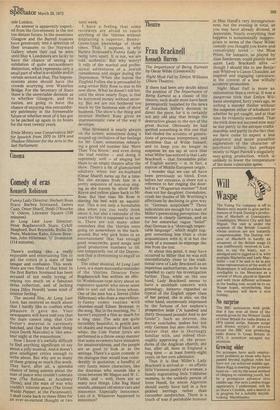Cinema
Comedy of eras
Kenneth Robinson
Funny Lady Director: Herbert Ross Stars: Barbra Streisand, James Caan, Omar Sharif, Heidi O'Rourke 'A' Odeon, ILeicester Square (138 minutes).
At Long Last Love Director: Peter Bogdanovich Stars: Cybill Shepherd, Burt Reynolds, Builio De Prete, Madeline Kahn, Eileen Brennan, John Hillerman. 'U' Dominion (114 minutes).
There's nothing like a really enjoyable and entertaining film to get the critics in a state of bad temper and confusion. This week there are two films of that kind. In the first Barbra Streisand has been accused of not really trying; of relying too much on a fabulous dress collection, and of lacking (says Dilys Powell) 'some kind of interior feeling.'
The second film, At Long Last Love, has received so much abuse that I hardly like to confess what pleasure it gave me. Your newspapers will have told you that the stars cannot sing; that Cole Porter's material is carelessly botched, and that the whole thing (says Derek Malcolm) is 'like amateur night at the mausoleum.'
Now I know it's awfully difficult to find anything significant to say about a jolly musical. And it doesn't give intelligent critics enough to write about. But why are so many of them griping so much this week. They have after all, a splendid chance of being solemn about the man of peace who couldn't tolerate war (The Refusal, at Academy Three), and the man of war who couldn't tolerate peace (The Great Waldo Pepper, at the Paramount). 1 shall come back to these films for an ever-so-earnest thought or two next week.
I have a feeling that some reviewers are afraid to touch anything of the 'thirties without displaying a superior, BennyGreen-type knowledge of those times. That, I suppose, is why Barbra Streisand's Funny Lady is being torn apart. It is not, we are told, authentic. But why worry?
It tells of the marital and professional adventures of a Jewish comedienne and singer during the Depression. When she leaves the Ziegfeld Follies she is persuaded by song-writer Billy Rose to star in his new show. What he doesn't tell her, until the show nearly flops, is that he borrowed money without secur ity. But we are not bothered too much by the business side of show business. The show's the thing and director Herbert Ross gives an impressionistic view of the way it develops.
Miss Streisand is nearly always on the screen, sometimes doing a souped-up recitative of her feelings for Mr Caan; sometimes rehearsing a good old number like 'More Than You Know,' and even doing the trad routine and doing it supremely well of singing her blues to an empty theatre after the show. There's a bit of glamourised adultery when her ex-husband (Omar Sharif) turns up for a time But she escapes from him in a pretty sequence of non-stop sing ing as she travels by silver Rolls Royce and yellow plane back to Mr Rose. But that time Mr Rose is sharing his bed with an aquatic
star. This is not only a formidable idea when you you really think
about it, but also a reminder of the years the film is supposed to be set in. There are not many other reminders that the 'thirties were going on somewhere in the background. But why pick holes in an entertainment that has enough good wisecracks, good songs and good production numbers to lift one temporarily out of the Depression that is threatening to engulf us today?
The other musical, At Long Last Love, is a more successful reminder of the 'thirties. Director Peter Bogdanovich has written an idiotic Wodehouse-type story about an expensive quartet who never seem able to sort out who loves whom. One of the men has a Jeeves (John Hillerman) who does a marvellously-funny comic routine with chamber-maid Eileen Brennan in the song, 'But in the morning, No.' I haven't enjoyed a film so much for a long time. The sets are quite incredibly beautiful, in gentle pastel shades and masses of black and white; the Cole Porter lyrics are performed in a throw-away manner that some reviewers have mistaken for amateurishness, and the people are as good to look at as the settings. There's a quiet comedy in the dialogue that would lose consi derably in quotation; a handful of very funny minor characters, like the doorman who sounds like a cross between Mr Magoo and W. C. Fields, and well, there are so' many nice things. Like Bag Band sounds, pleasant old motor cars and innocence. Especially innocence. Lots of it. Whatever happened to innocence?


































 Previous page
Previous page